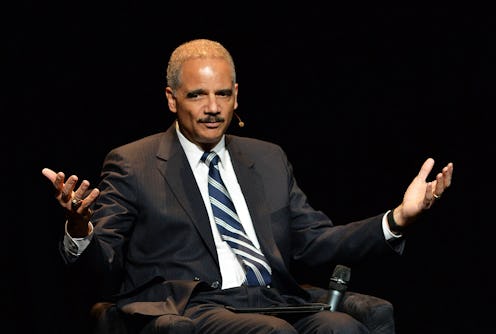News
Eric Holder Changes His Tune On Edward Snowden
The man once in charge of prosecuting Edward Snowden just called his actions a "public service." That's right. Former Attorney General Eric Holder changed his tune on Snowden's massive data dump — or at least somewhat. Speaking with David Axelrod on The Axe Files, a podcast hosted by the former Obama advisor and election guru, Holder did say that Snowden did break the law and should pay the price, but that it may have helped society. Holder spoke about the whole ordeal in more of a nuanced way than he ever did as attorney general:
We can certainly argue about the way in which Snowden did what he did, but I think that he actually performed a public service by raising the debate that we engaged in and by the changes that we made.
Snowden was an NSA contractor who became privy to several global surveillance programs, some of them run by the NSA itself. To expose the illegal practices in 2013, he stole data detailing the programs and flew to Hong Kong. There he worked with Wikileaks to disseminate the information before quickly continuing to Russia, where he has has been stuck ever since, avoiding American prosecution. His current residency permit expires in August 2017.
Meanwhile, back stateside, things have changed quite a bit since in the following years. Last year, an appeals court found the NSA mass collection of data to be illegal, arguing it was not authorized by federal law. Then in June, the president signed the USA Freedom Act, which limited the ways government agencies could collect data. The NSA ceased collecting bulk phone data in November, moving to a "targeted and focused" approach that doesn't catch every American in its crosshairs.
Still, despite the friendlier rhetoric on the big picture of the leaks, Holder thinks Snowden should pay for what he did. "What he did — and the way he did it — was inappropriate and illegal," Holder told Axelrod.
Snowden still faces charges in the United States — some of which were brought under the Espionage Act. Holder also feels strongly about the downside of the revelations:
He harmed American interests. ... I know there are ways in which certain of our agents were put at risk, relationships with other countries were harmed, our ability to keep the American people safe was compromised. There were all kinds of re-dos that had to be put in place as a result of what he did, and while those things were being done, we were blind in certain really critical areas. So what he did was not without consequence.
Therefore, Holder's ultimate message hasn't changed much since 2014. At the time, Holder said he would be willing to sit down and make a deal with Snowden if he were willing to enter a plea. Snowden has said he won't return until he's certain he will get a fair trial. He wants to make his case to a jury, something not allowed in cases brought using the Espionage Act — and he also could not refer to himself as a "whistleblower."
Holder said he thinks Snowden needs to decide what he's going to do — but either come back to the United States. "I think that he's got to make a decision," Holder told Axelrod. "He's broken the law in my view. He needs to get lawyers, come on back, and decide, see what he wants to do: Go to trial, try to cut a deal." Perhaps the most interesting part of the interview is the deal Holder thinks he can get:
I think there has to be a consequence for what he has done. But, I think in deciding what an appropriate sentence should be, I think a judge could take into account the usefulness of having had that national debate.
This is not the first time Holder has spoken about Snowden since he left office. In July he told Yahoo! News that he thought Snowden's revelations "spurred a necessary debate." Now the thing to watch is whether Holder's comments on Monday spur Snowden to head home — either for a trial or to enter a plea. One hitch in his plan for a public trial is Snowden's approval rating: While hugely popular overseas, Snowden remains unpopular in the United States.
